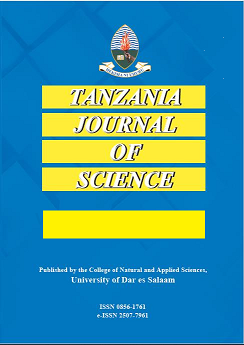The performance of maize crop during acid amelioration with organic residues in soils of Mtwara, Tanzania
Abstract
This study evaluated acid ameliorative potential and their effects on maize growth of four organic residues namely wild spikenard, cordia, cowpea and pigeon peas through incubations with or without sulphur. This was done in order to recommend potential organic residue source that could ameliorate soil acidity associated with sulphur dusting. Increased levels of sulphur in the soils reduced the growth and dry matter yields of maize due to intense acidification while maize growth and dry matter yields in soils which organic residues were incorporated was enhanced. Enhancement in maize performance may be a result of reduced soil acidity due to ameliorative effects of residues which was directly related to the alkalinity of the organic residues. Pigeon pea and cordia residues, which had higher alkalinity, resulted in a higher acid amelioration compared to senescent cowpea and wild spikenard, which had lower alkalinity. The performance of maize grown in respective soil incorporated with the organic residues followed the same pattern. The finding suggests different acid ameliorating potential of residues, pigeon peas and cordia being the most effective. The residues are therefore recommended in cashew farming system in order to improve soil fertility to enhance crop production.


